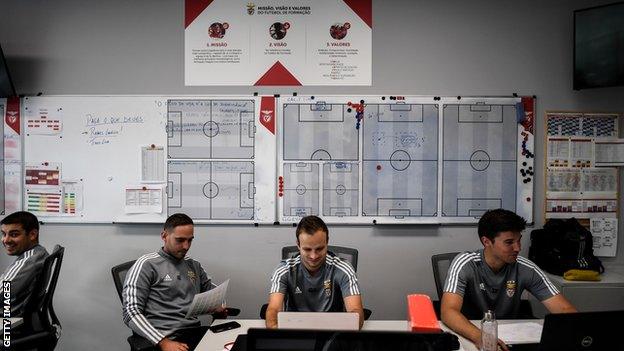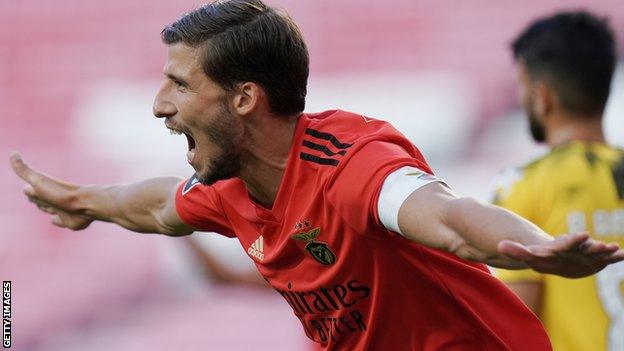How Benfica established themselves as major production line for European stars
- Published

Despite consistently selling their best young players, Benfica reached the Europa League final in 2013 and 2014
Europa League: Benfica v Rangers | |
|---|---|
Venue: Estadio da Luz, Lisbon Date: 5 November Time: 17:55 GMT | |
Coverage: Listen to updates on BBC Radio Scotland and follow live text commentary on the BBC Sport website and app |
"I have a personal dream for Benfica to win the Champions League with four or five kids from the academy playing in the team," Rodrigo Magalhaes explains.
The Benfica academy technical coordinator has seen dozens of his charges rise through the ranks to the first team in his 15 years at the club. His dream is coming closer to fruition but, unfortunately for Magalhaes, the graduates may not achieve it in the red of the Portuguese giants.
There has been a conveyor belt of talent emerging from the Benfica Campus, with Manchester City spending almost £200m on players who have spent their formative years with As Aguias, not to mention Joao Felix, who was sold for £113m to Atletico Madrid last summer.
Ruben Dias is the latest to depart for big money, joining Pep Guardiola's City side for £62m. The centre-back arrived at the academy aged 11 after being spotted playing against Benfica by Magalhaes.
Their recruitment is focused on the "golden age" of children between six and 13, with the club having 470 players within the academy set-up.
"I don't think it is a lot of players - it is an investment," says Magalhaes. "When we compare the huge cost of buying a top player aged 22 to what we spend on youth, we could do it 20 times over and it would still be cheaper than buying a 22-year-old.
"We recruit, put them into Benfica methodology and give them long-term development with the goal to put the players in our first team. This is our mission."
Once a talented youngster is identified and signed, they will be given a personal programme to work on alongside team training. There are numerous parameters for the scouting network, with Dias an example of someone who was selected for having key attributes other than just technical ability.
"Ruben Dias came to Benfica as an average player - his technique was good but not top level," Magalhaes explains. "It was his work capacity that enabled him to reach his level.
"He had different things that distinguish him from the others: leadership and communication. He's like a general on the pitch. When I saw Ruben play under-11s against Benfica, he talked to everyone and organised the team, so the characteristics that allowed Ruben to come to Benfica were communication and leadership."

Ruben Dias started a sixth consecutive game for Manchester City at the weekend - that equalled the longest sequence managed by any of the club's centre-backs last season
In addition to technical improvement, individual programmes consist of medical, physical and psychological elements.
"We build a plan together with the player, asking for his input, the next development steps, what he needs to work on, whether it's more technical - heading or passing - or whether he needs to work on the physical or game understanding, and that is built into the programme," technical director Pedro Marques says.
"Each team has a programme but it is complemented with some individual development sessions, which is an allocation of time that can be filled with anything they need.
"Some might need to work on technical things and they will do that on the pitch, others in the gym. They are very much connected with the needs and priorities that we need to develop at this phase of the pathway."

Watch 13 first-round ties on BBC iPlayer and the BBC Sport website and app this weekend. Find out more here.

Nurturing a player deemed average upon arrival to become a £62m defender is a sign of the success enjoyed by the system in place at Benfica.
There is patience, too, in the planning. Bernardo Silva, now also at Manchester City, stood out in the younger age groups but struggled in his teenage years as others had growth spurts, leaving him unable to cope with the game's physicality.
The club, however, knew his technical capabilities would eventually allow him to be an international player, whereas others may have released him based on match performances alone.
"At younger age groups the emphasis is on playing and enjoying, playing with freedom and developing the passion and overcoming problems," Marques says.
"In the end, there will be a winner and a loser but it is not where we put the biggest focus. We look at the games as part of the development, it is where you put into practice what you have been developing and it's a good assessment for them."
How Benfica established themselves as European production line | |||
|---|---|---|---|
Player | Sold to | Fee | |
Ruben Dias | Manchester City | 2020 | £65m |
Joao Felix | Atletico Madrid | 2019 | £113m |
Joao Carvalho | Nottingham Forest | 2018 | £13.2m |
Nelson Semedo | Barcelona | 2017 | £30.8m |
Ederson | Manchester City | 2017 | £35m |
Victor Lindelof | Manchester United | 2017 | £31m |
Goncalo Guedes | PSG | 2017 | £25.5m |
Helder Costa | Monaco | 2017 | £13m |
Renato Sanches | Bayern Munich | 2016 | £31.5m* |
Joao Cancelo | Valencia | 2015 | £13.5m* |
Bernardo Silva | Monaco | 2015 | £14.2m* |
Andre Gomes | Valencia | 2015 | £18m* |
Ivan Cavaleiro | Monaco | 2015 | £13.5m* |
*reported fee | |||
These games also allow players to try new things, which might explain why Guardiola has taken a shine to Benfica graduates, thanks to their adaptability during matches.
"The modern player needs to be able to perform different roles and positions in the same game," Magalhaes says. "Bernardo plays like a midfielder, then a winger. Joao Cancelo plays like a winger, then an offensive right-back. It makes them athletic, improves their knowledge and gives them a different view of the game."
In addition to a footballing education, there is a commitment to prepare players for the outside world. Only a fraction of youths who go through the academy system make it as professionals, let alone at Benfica. Ten staff run the educational side of things within the club, where manners are almost as important as performances on the pitch.
"It is very important for us; we have a holistic approach. We don't want to just develop the player, we want to develop the human being, so we have social and educational support at Benfica Campus with teachers and with a team that control the process in civil life," Magalhaes says.
"We need to help not only the player but the human being. They need to develop their personality and be prepared to face the problems of life. Only a small percentage of players go on to a professional level."
The academy is always trying to improve. Benfica have basketball, handball and hockey teams, allowing easy access to innovative coaching ideas. And they look to football clubs around the world for inspiration too; Marques worked for Manchester City for eight years, so he knows how other elite teams operate.
"We like to think talent can be born anywhere and good ideas can come from anywhere, too," he says. "We are always challenging ourselves as we do not want to just sustain this success, we want to go beyond and keep improving every day.
"You can learn from other areas that are intimately connected with developing talent, like music, the arts, theatre. There are various ways we can get marginal gains and little nudges to our system on top of that."
For every Felix or Dias, there will be plenty who do not make it. Their coaches treat each player equally, working on maximising their potential to ensure footballing success and financial sustainability for Benfica.
But as Marques says: "Our biggest purpose is to help them achieve their dreams."

Small Axe Trailer: Sneak peek of Steve McQueen's powerful new drama
